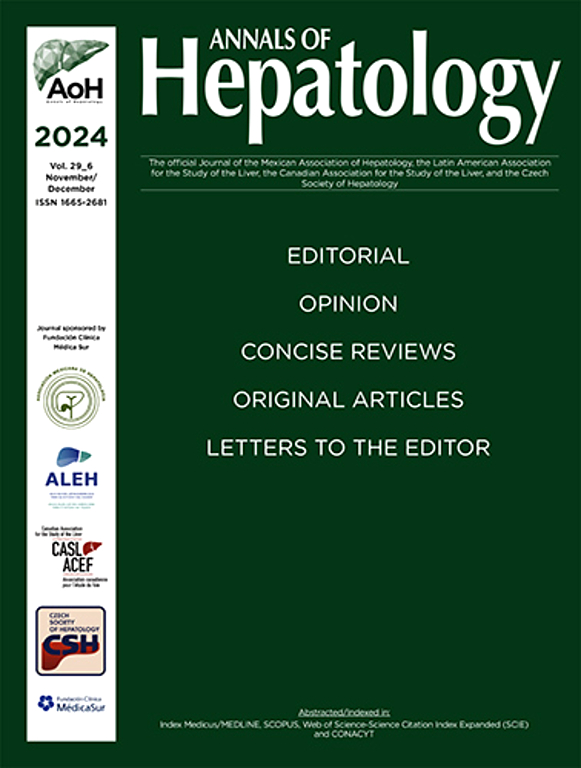HLA-G liver expression in chronically HIV/hepatitis C-coinfected individuals.
IF 3.7
3区 医学
Q2 GASTROENTEROLOGY & HEPATOLOGY
引用次数: 0
Abstract
Introduction and Objectives
Hepatitis C-induced liver disease represents a significant threat to the survival of people living with HIV. HIV/HCV-coinfected individuals have a more rapid progression to cirrhosis and its complications than HCV monoinfected patients. Although the underlying mechanisms remain unclear, HLA-G, a non-classical class I HLA molecule, has a well-recognized property to down-regulate the immune response against viruses and may favor the progression of chronic hepatitis C.
Materials and Methods
We analyzed HLA-G expression in 59 liver specimens of patients harboring chronic HCV and HIV coinfection and stratified the findings according to clinical and histopathological features.
Results
Genotype 1 was the most prevalent (88%); the HLA-G expression was observed in 38 (64%) liver specimens, and it was more frequent in more severe stages than in milder stages of chronic hepatitis (94,1% x 55%; p<0.01). HLA-G expression in the liver was not correlated to antiviral response to hepatitis C therapy with pegylated-IFN-α plus ribavirin.
Conclusions
HLA-G expression in the context of HCV/HIV coinfection is a complex process modulated by many factors. HLA-G expression may play a role in the mechanisms that facilitate disease progression and may contribute to the deterioration of the immune response against HCV in individuals living with HIV.

慢性HIV/丙型肝炎合并感染者的HLA-G肝脏表达。
前言和目标:丙型肝炎引起的肝病对艾滋病毒感染者的生存构成重大威胁。HIV/HCV合并感染的个体比HCV单一感染的患者更迅速地发展为肝硬化及其并发症。尽管潜在的机制尚不清楚,但HLA- g作为一种非经典I类HLA分子,具有众所周知的下调对病毒的免疫反应的特性,并可能有利于慢性丙型肝炎的进展。材料和方法:我们分析了59例慢性HCV和HIV合并感染患者肝脏标本中HLA- g的表达,并根据临床和组织病理学特征对结果进行了分层。结果:基因1型最常见(88%);38例(64%)肝脏标本中检测到HLA-G表达,重度慢性肝炎患者比轻度慢性肝炎患者更常见(94.1% x 55%;结论:HCV/HIV合并感染时HLA-G的表达是一个受多种因素调节的复杂过程。HLA-G表达可能在促进疾病进展的机制中发挥作用,并可能导致艾滋病毒感染者对HCV的免疫反应恶化。
本文章由计算机程序翻译,如有差异,请以英文原文为准。
求助全文
约1分钟内获得全文
求助全文
来源期刊

Annals of hepatology
医学-胃肠肝病学
CiteScore
7.90
自引率
2.60%
发文量
183
审稿时长
4-8 weeks
期刊介绍:
Annals of Hepatology publishes original research on the biology and diseases of the liver in both humans and experimental models. Contributions may be submitted as regular articles. The journal also publishes concise reviews of both basic and clinical topics.
 求助内容:
求助内容: 应助结果提醒方式:
应助结果提醒方式:


